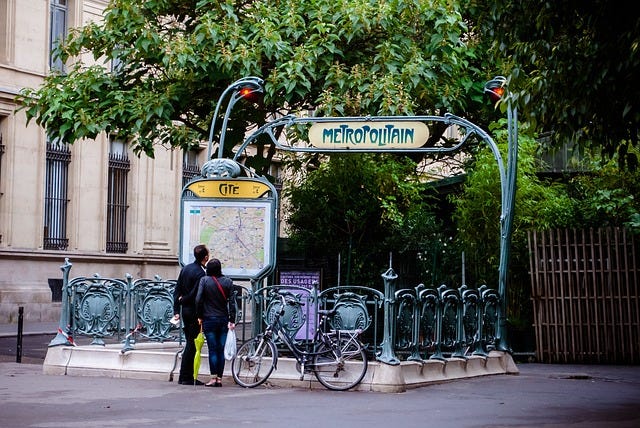I was my high school's star French student which meant more than praise from my teacher. There was a ceremony at New York's Alliance Française cultural center where I got a fancy, beribboned certificate and shook the hand of the French Ambassador to the U.S.
In junior high school, I was already so good that the French teacher--who was from Alsace--sometimes asked me to stop answering questions because I always seemed to know the answer. It helped that my mother was a francophone and I'd started French lessons in fourth grade, but also knowing two languages early on was a good foundation for learning a third.
It took me many years to get to France, but as soon as I arrived, I felt comfortable, so much so that people would ask me where I was from (perhaps because of some strong Scandinavian DNA). When I'd say the U.S. they would insist that Americans don't speak French. Cab drivers and even waiters would note that my French was good, though one waiter in Paris responded to a question about the menu with a snippy "I don't speak English." I said "Moi non plus" (me, neither) and he laughed and dropped his attitude.
Now and then, either from being overwhelmed by how beautiful the city was, or dealing with jet lag, I made a mistake, like the time I ordered iced tea incorrectly: "Thé avec des glaçons." The waiter dutifully brought me a cup of tea with a little dish of ice cubes. Somehow I had forgotten the simple "thé glassé."
The funniest moment was eating at a restaurant known for its plateau de fruits de mer: a large, stunning, three-tiered serving dish with an amazing assortment of seafoods. I ordered the right wine and had no trouble at any point until the water asked if he could clear the table and I said, "Oui, merci, nous sommes finis." Deadpan, he switched to English and said "If you are finished, I cannot help you, but if you have finished, we can discuss dessert."
I had made a beginner's mistake after eight years of French behind me: I used the wrong helping verb. But I rallied, and in French I thanked him for the grammar lesson and this time he smiled. My tablemates had absolutely no idea what had happened, but were too happy with the wine and the food to care.
These moments were blips. All across France I got into conversations with store owners, cab drivers, tour guides and even a lovely older couple on a night-time bateaux mouches dinner cruise along the Seine. They overheard me sigh "C'est beau comme un rêve" as I leaned on the rail, marveling at the city I had dreamed of visiting so many years ago.
That night, I noticed I was using the imperfect tense after two glasses of wine. After three, the subjunctive came back to me like an old friend.
And many years after this epic trip, it supplied fodder for one of my favorite published short stories: “Cadenza.”
Lev Raphael is the author of 27 books in genres from memoir to mystery and has done invited talks and readings in nine different countries, not all of them in English. Venues have included The Library of Congress and Oxford University. He mentors and edits writers at writewithoutborders.com.
Free Photo by Nuno Lopes from Pixabay





Sounds like a blast Lev. Never understood why a non-native speaker has to get attitude from the locals. Hey, we're tryin
We can't go deeply into another culture without its language. Good post.